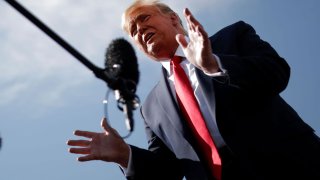
U.S. President Donald Trump speaks to reporters as he arrives at Phoenix Sky Harbor International Airport in Phoenix, Arizona, October 19, 2020.
Former President Donald Trump's financial records have been the source of endless debate since he declined to release his tax returns during the 2016 presidential election, or at any point since.
Now they are once again in the news: Thanks to a new ruling from the U.S. Supreme Court, Trump's accountants have provided his financial records to Manhattan district attorney Cyrus Vance Jr. as part of a grand jury investigation into Trump and the Trump Organization, for possible tax violations. Vance's office also revealed in August that Trump and his company could be under investigation for possible insurance and bank fraud.
As of Thursday, Trump's tax records had reportedly been turned over to Vance's office, days after the Supreme Court's ruling allowed the district attorney to enforce a subpoena to obtain those records from Trump's longtime accounting firm, Mazars USA.
However, while Vance's office has obtained those records in connection with its grand jury investigation, as NBC News noted, state law requires that grand jury proceedings, and the evidence presented in them, remain confidential.
Get Tri-state area news delivered to your inbox. Sign up for NBC New York's News Headlines newsletter.
In fact, the only way that the Trump financial records given to the grand jury will ever enter the public domain is if Vance's office eventually brings criminal charges and includes the records, or portions of them, as evidence in a potential criminal complaint, which would be part of a public court filing.
With Vance's office having revealed little information about the investigation to this point, it is hard to know how long it could take for the grand jury to decide whether there is a basis for charges.
Money Report
Trump's legal team had sought to block a grand jury subpoena from Vance's office for the former president's records, including several years of his personal and corporate tax returns. But a Monday order from the nation's highest court, with no noted dissents, rejected Trump's latest and last available attempt to shield those records.
Since Trump had no further legal recourse to prevent Vance's office from enforcing its subpoena seeking the records from Mazars USA, a failure to comply could have resulted in the firm being held in contempt of court. However, Mazars had maintained that the firm would comply with the final order of the court system.
The Supreme Court's ruling came just a few days after The New York Times reported that Vance's office hired a former federal prosecutor, Mark Pomerantz, to join the Trump investigation. Pomerantz's background, which includes a wealth of experience working on white-collar fraud cases, fueled speculation that the investigation by Vance's office is ramping up.
A spokesman for Vance had indicated on Monday that the office would move quickly to enforce its subpoena on Mazars USA, CNBC previously reported.
"The work continues," Vance tweeted Monday.
UPDATE: This article has been updated to include the news that Trump's tax records have been turned over to prosecutors.
Check out: The best credit cards for building credit of 2021
Don't miss: Trump reportedly paid $750 in taxes in 2016 and 2017. Here's how much the average American pays






